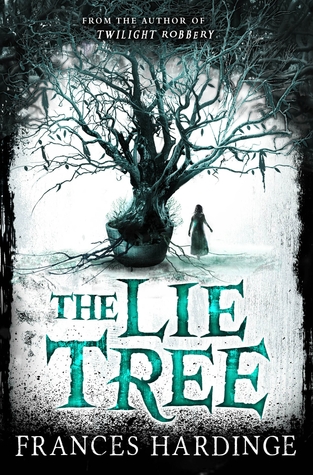When Faith’s family moves suddenly to an out-of-the-way island to conduct an archaeological dig, they do so under threat of suspicion and fear, though fear of what Faith isn’t told. (She’s only fourteen, and nice young ladies in the year 1868 don’t ask questions.) But Faith herself hopes that this will be her opportunity to show her father, a prominent archaeologist, that she can be a scholarly companion to him, that she is worth taking seriously. Once they reach the island, though, it becomes clear that her worth remains what it has always been: She’s as valuable as the trouble she can save her family by behaving decorously and taking care of her little brother, Howard.
When tragedy strikes her family, Faith has to make use of all her cunning and bravery to delve into her father’s secrets — including the mysterious Lie Tree.

The Lie Tree is, with all the good and less good this implies, a very very Frances Hardinge sort of book. By which I mean that it’s slow to crank its story into gear, and you sit through quite a bit of table-setting before Hardinge lets you taste the meal; but when it does get going, you’re certain of a satisfactory conclusion. More Hardingely still, you can be sure that nobody in the book will be just one thing. If a character is kindly or catty or condescending early on, you are nearly guaranteed to see another side of them before the book is over.
Faith had always told herself that she was not like other ladies. But neither, it seemed, were other ladies.
I am mightily preoccupied with the not-one-thing-ness of people. It’s easy to take the quick and dirty route of learning a little about someone and allowing our biases to fill in the rest, even — maybe especially — when we are ourselves trying to fight free of other people’s restrictive narratives of what we are supposed to be like. The half-truths we tell ourselves about other people because it’s convenient aren’t the type of lies Faith thinks to feed to the Lie Tree, but the tree thrives on those untruths as well. While Faith badly wants to be seen for who she is, not just who she pretends to be, the conventions and norms of her time frequently blind her to the fact that the people around her are often as constricted as she is (and more).
Excellent stuff, all in all. Frances Hardinge knows how to get me with her Themes and Feelings and Ladies Who Seem One Way But Actually Have Hidden Depths Like All People Do. I’ll just leave you with this, my of-course favorite moment of the book:
“This is a battlefield, Faith! Women find themselves on battlefields, just as men do. We are given no weapons, and cannot be seen to fight. But fight we must, or perish.”